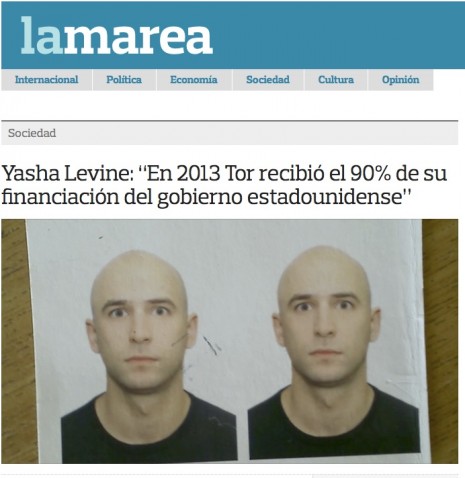
Note: This is a slightly abridged English version of an interview conducted by the great Berlin-based journalist Àngel Ferrero. It was originally published in the Spanish media cooperative La Marea. You can read the full version in Spanish here. For background, read Yasha Levine’s Tor coverage here, here and here.
* * *
Yasha Levine: Tor is a tool that’s supposed to hide your identity on the Internet — making it impossible for someone to observe who you are and what you’re doing on the net. It’s easy to use. All you have to do is download an app built into a modified version of Firefox and browse the web that way. Tor has a huge following among political activists and journalists — and has been endorsed and promoted by Edward Snowden, Glenn Greenwald and the Electronic Frontier Foundation.
Tor’s supporters see it as a magical cloak that renders people invisible on net. They say that Tor is vital for political dissidents in totalitarian regimes like China and Iran, but also promote Tor as a solution to the NSA and the U.S. surveillance state.
Five months ago you wrote a controversial article about Tor. Who are the developers behind it?
There is a small core group of developers employed full time by The Tor Network, a non-profit organization set up in 2005. It is an open source project, so volunteers contribute to the development. And apparently, even the NSA periodically sends in bug fixes as well!
According to your investigation, the developers of Tor have had connections with government agencies, the NSA amongst them.
Well, it’s not just that some of the developers have ties to government agencies. The entire project was developed and continues to be actively funded by the U.S. National Security State: Pentagon, State Department, USAID and other federal government agencies that are dedicated to expanding U.S. power abroad.
The origins of Tor go back to 1995, when military scientists at the Naval Research Laboratory were tasked with developing technology that allowed intelligence and military personnel to work online undercover without fear of being unmasked by someone monitoring their Internet activity. Whether it was a undercover agent logging into his CIA.gov mail account from Syria or infiltrating a jihadist or animal rights online group — anyone looking at or sniffing the connection would immediately be able to blow their cover.
So a couple of scientists hit up on an idea called “onion routing” — a method that redirected traffic into a parallel peer-to-peer network and bounced it around randomly before sending it off to its final destination. The idea was to move it around so as to confuse and disconnect its origin and destination and make it impossible for someone to observe who you are or where you’re going on the Internet.
This research was bankrolled by the Office of Naval Research and DARPA. It was led by a team of scientists — Paul Syverson, Michael Reed and David Goldschlag — all of them working for the Naval Research Laboratory, sitting inside the massive Joint Base Anacostia-Bolling military base in Southeast Washington, D.C.
They built an “onion router” system that worked, but quickly realized that only technically anonymizing traffic was not enough — not if the system was being used exclusively by military and intelligence. In order to cloak spooks effectively, Tor needed to be used by a diverse group of people: activists, students, corporate researchers, soccer moms, journalists, drug dealers, hackers, child pornographers, foreign agents, terrorists — the more diverse the group, the better the spooks could hide in the crowd in plain sight.
That’s why starting in 2004, Tor was spun off as an independent open source project and began to distance itself from its military-intelligence ties.
Most people now think of Tor is somehow hostile to the U.S. government, but in fact it continues to receive the bulk of its funds from the same military-intelligence agencies that spawned it. In 2013, Tor got over 90% of its funding from the U.S. government, with the largest grant coming from the Pentagon.
Tor is essentially a private military contractor. It’s a small contractor and operates a non-profit, but it is a government contractor nonetheless. Tor co-founder Roger Dingledine even described his work that way, telling a security conference in 2004: “I contract for the United States Government to built anonymity technology for them and deploy it.”
Former Wikileaks volunteer Jacob Appelbaum also worked for Tor.
Yes, Jacob Appelbaum has been with Tor for a while, first as a volunteer and then in 2008 as a salaried developer.
Jacob is a well-known security researcher/good guy hacker. His connection to Tor and Wikileaks is very interesting.
In 2010 he was making about $100,000 a year working for Tor — the bulk of which was coming from U.S. State Department and intel-related grants. Right in the midst of that, Jacob emerged as an important Wikileaks volunteer. He used his celebrity status in the hacker world to promote the organization, helped secure Wikileaks’ servers with Tor technology and even bailed Assange out of public speaking gigs when the heat from US authorities got too hot.
That same year, Rolling Stone did a big story on Jacob Appelbaum, profiling him as a brilliant techno-anarchist rebel who’s fighting the good fight by taking on America’s evil military-surveillance apparatus — calling him the “American Wikileaks Hacker.”
Appelbaum emerged as a central in the Edward Snowden NSA leaks as well.
If you recall, Edward Snowden first contacted Glenn Greenwald, but Greenwald initially brushed him off as a crackpot. So Snowden went to Laura Poitras. Unlike Greenwald, she took Snowden seriously and decided to spend some time checking out his story. Snowden hadn’t yet revealed his identity at that point. So Poitras brought in Appelbaum to use his expertise to help vet Edward Snowden.
So just like that, you have a guy who had spent the past five years working as a security contractor for an outfit funded by the U.S. National Security State about as close to Snowden as you could get.
Even weirder is that Edward Snowden himself ran several high speed Tor nodes while working as an NSA contractor and had reached out and met with another key Tor developer just weeks before first contacting Glenn Greenwald…
What is then, in your opinion, the objective of Tor?
Well… there are several possibilities.
At it’s simplest, Tor performs the function for which it was originally created by the U.S. Navy and DARPA — that is, a tool that cloaks the online identity of government agents while they are in the field. And the rest of this stuff — the online protection of activists, dissidents, journalists, criminals, etc — is just a cover story meant to bring in as diverse a group of Tor users as possible, making Tor’s intel cloaking capabilities so much stronger.
Given the recent news of Tor being routinely undermined by U.S. intelligence, Tor could very well be a giant honeypot — drawing in people who have something to hide and then selecting them for total surveillance.
Tor is also a soft-power weapon of U.S. Empire — a tool deployed against countries like China and Iran to make it harder for them to control the Internet.
Tor could also be all those things: a honey pot, a tool of US intelligence and a soft-power weapon. I don’t think those functions are mutually exclusive. In fact, they may very well be synergistic.
How was your article received by the Tor developers and the users’ community?
Not well. Not well at all.
Instead of being welcomed by the privacy community and sparking a discussion about the some of the troubling aspects of Tor, my reporting was met with a nasty smear campaign. It was led by some of the most prominent privacy and anti-surveillance activists in the country —top people from groups like the ACLU, Electronic Frontier Foundation, Freedom of the Press Foundation, and Pierre Omidyar’s First Look Media. None of them disputed the facts, but resorted to the kind of PR smear tactics one usually sees used by oil company PR flacks, but not by privacy hacktivists.
In short: they tried to discredit my reporting by character assassination.
I was called a CIA agent, a rapist, a misogynist, a stalker, a conspiracy theorist, a loon. A Tor developer said I didn’t deserve to live, while the leading technology and privacy expert at the ACLU compared my reporting to the Elders of Zion — a sick anti-Semitic forgery disseminated by the Tsar’s secret police that helped unleash deadly pogroms against Jews across the Russian Empire in the early 20th century. The Guardian published a defamatory article by a Tor supporter calling me a sexist stalker, which the Guardian had to retract and apologize for. Even Anonymous joined in, using the biggest Twitter account of the movement to call for my death.
Little is known about the libertarian ideology of people generally described as “digital anarchists”. How do you think it influences his work?
Yeah, libertarian ideology is closely connected with Tor and the mythology of Tor and other Internet privacy technology.
It may be that there are legitimate uses for Tor. For instance, Tor might provide a good way for people in foreign countries to circumvent Internet censorship. These people might not care that Tor is funded and compromised by the US government, because they’re not hiding from the U.S. government. They are trying to hide from their own government.
But supporters of Tor go way beyond this.
Many of the most ardent supporters of Tor are hardcore libertarians — that includes Tor developers like Jacob Appelbaum, who has crafted an image for himself of some kind of anti-government rebel currently hiding out in Berlin from his NSA pursuers. They’re against mass politics and democracy, and desperately want to believe in a technocratic, individualistic solution to government surveillance.
And that’w where Tor comes in: They see it not as a limited tool, but a powerful magic cloak — like something out Harry Potter — that protect people and makes them invisible to Big Brother.
Naturally, Tor supporters get upset when this magic anti-government weapon turns out to a tool of the very government they’re fighting against. And as for Tor developers like Appelbaum — I can understand why they’re upset. They’ve sold themselves to the public as anti-National Security State rebels, but have actually been living off the largesse of their NatSec State nemesis.
And no one likes to be outed as a fraud.
Note: This is a slightly abridged English version of an interview conducted by the great Berlin-based journalist Àngel Ferrero. It was originally published in the Spanish media cooperative La Marea. You can read the full version in Spanish here. For background, read Yasha Levine’s Tor coverage here, here and here.
Read more: tor, yasha levine, Team eXiled, Surveillance Valley


Got something to say to us? Then send us a letter.
Want us to stick around? Donate to The eXiled.
Twitter twerps can follow us at twitter.com/exiledonline















Leave a Comment
(Open to all. Comments can and will be censored at whim and without warning.)
Subscribe to the comments via RSS Feed